Here is a very brief summary of the research topics we are currently working on in Morocco.
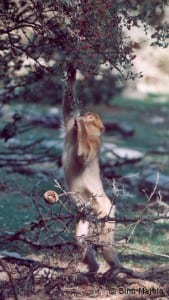 Ecology and food competition
Ecology and food competition
The Barbary macaque mainly feeds on low-quality, non-monopolisable food sources such as grass and leaves and it should thus experience a low level of contest food competition. However, recent studies evidence that folivores may deal with the same ecological pressures as frugivores. Our research on this topic focuses on determining the type and level of food competition that Barbary macaques face across seasons, and on the consequences that food competition has on feeding tactics, ranging patterns and stress. These factors are also analysed in relation to group size and its composition, home range size and quality, and level of human disturbance in order to test the validity of socio-ecological models. Professor Qarro continues his work on bark stripping behaviour in the Barbary macaque and on forest regeneration that has fundamental implications for the conservation of this species.
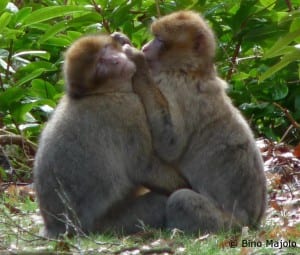 Social relationships and cooperation
Social relationships and cooperation
In a number of group-living species, particularly among primates, group members can establish and maintain social relationships, based on cooperation and/or on the reciprocal exchange of benefits, that somehow resemble human friendship. There is evidence from long-term studies that such friendly relationships give benefits to individual fitness (i.e. increased reproductive success or longevity). In macaques, friendly relationships are mainly maintained through grooming exchange. Our aim here is to analyse the role that contingent factors (e.g. partner’s availability), cognitive abilities, relationship quality, and emotional response to social interactions play in explaining the choice of social partner, the reciprocation of benefits exchanged and the trading of grooming for other benefits. This topic is tackled by collecting observational data and by running experiments requiring animals to cooperate in order to obtain food rewards.
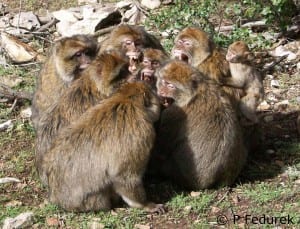 Conflict management
Conflict management
Reconciliation evolved to restore friendly relationships damaged by conflicts. Former opponents face a period of high anxiety after a conflict, particularly when reconciliation does not take place. This is due to the uncertainty of the aftermath of an aggressive interaction in terms of damage to the friendly relationship and risk of receiving aggression from the former opponent or third individuals. This study aims to analyse post-conflict social interactions between former opponents and/or third parties in relation to differences in anxiety level and resource-holding-potential among the animals involved. For example, we aim to determine if third parties take advantage of the emotional status of former opponents by requesting grooming from them.
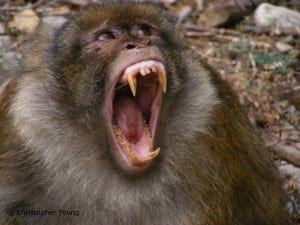 Reproductive tactics and stress hormones
Reproductive tactics and stress hormones
Unlike many primate species, Barbary macaque males frequently interact friendly with one another, establish close bonds with infants and use them to mediate social interactions with other group males. The first aim of this project, related to the previous two, is to analyse the social and reproductive tactics (e.g. coalition formation, sneaky copulation) males use to gain access to oestrous females. This is investigated also in relation to a group’s sex ratio and to female oestrous synchrony. Moreover, we aim to analyse the possible causes (e.g. mating vs. non-mating season, the number of oestrous females) of changes in the level of stress hormones in male macaques and their consequences on social and reproductive tactics.
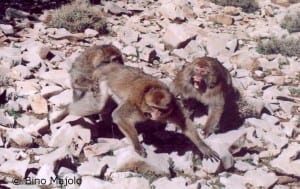 Between-group competition
Between-group competition
Work on this topic so far has been mainly done on an opportunistic basis (i.e. when we observe a between-group encounter!), looking at the location and result of any encounter observed, and the participation of the monkeys of different sex, age and social status. In the near future we plan to focus in greater detail on this topic and to analyse decision-making processes (e.g. to cooperate or follow a free-raiding strategy) during between-group encounters.
Parasite infection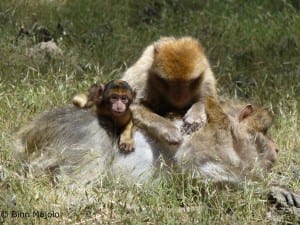
Here we focus on both endo- and ecto-parasites to determine if infection load in monkeys is affected by group size, habitat quality, sex, age and social status. We have just completed a pilot study to try to assess which endo-parasite species is hosted by the Barbary macaque and plan to run a larger study on this topic starting next year.
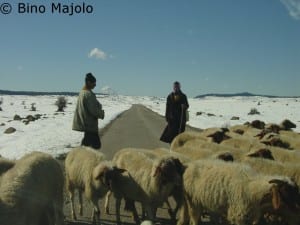 Human-wildlife interactions
Human-wildlife interactions
This multi-disciplinary project is in a very early stage and we are still designing it. We plan to combine together conservation biology, behavioural ecology and social anthropology to analyse the causes and consequences of the population decline of the Barbary macaque, how human activity affects macaque ranging patterns, behaviour and reproductive success, how local human populations view the Barbary macaque and use the land inhabited by the monkeys. Our ultimate goal is to develop a series of proposals to save the Barbary macaques living in the Middle Atlas Mountains, avoid or at least limit conflicts between local human populations and the macaques, and to boost the local economy by, for example, developing some form of eco-tourism.